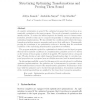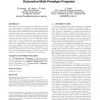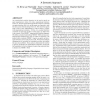280 search results - page 16 / 56 » Equivalence of Two Formal Semantics for Functional Logic Pro... |
ENTCS
2007
13 years 7 months ago
2007
A compiler optimization is sound if the optimized program that it produces is semantically equivalent to the input program. The proofs of semantic equivalence are usually tedious....
PPDP
2004
Springer
14 years 1 months ago
2004
Springer
We introduce the theoretical basis for tracing lazy functional logic computations in a declarative multi-paradigm language like Curry. Tracing computations is a difficult task due...
ESOP
2010
Springer
14 years 5 months ago
2010
Springer
Formal reasoning about concurrent programs is usually done with the assumption that the underlying memory model is sequentially consistent, i.e. the execution outcome is equivalen...
POPL
2012
ACM
12 years 3 months ago
2012
ACM
There has been great interest in creating probabilistic programming languages to simplify the coding of statistical tasks; however, there still does not exist a formal language th...
ATAL
2010
Springer
13 years 9 months ago
2010
Springer
An organizational modeling language can be used to specify an agent organization in terms of its roles, organizational structure, norms, etc. Such an organizational specification ...



